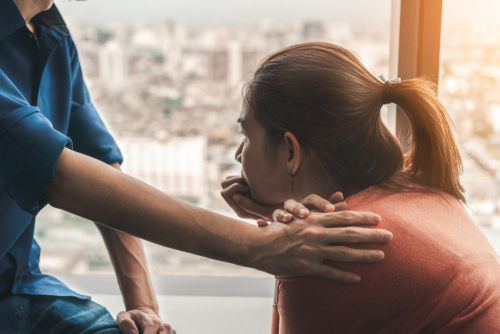Treatment for Depression
There are a number of different treatment options available for depression, but finding the right treatment will depend on the type of depression, the severity, and the individual. Once you have been diagnosed with depression, it is critical that you work closely with your medical team to select the best treatment option for you and your needs. While treatment is determined on a case-by-case basis, the most common methods are outlined below.
Psychotherapy
Psychotherapy, also known as talk therapy, is an effective treatment method for all types of depression. This form of therapy is usually used in conjunction with antidepressant medications or other forms of therapy. Below are a handful of the most common types of psychotherapy used to treat depression.
- Interpersonal Therapy (IPT) is centered around improving issues that may exist in an individual’s personal relationships and discussing other modifications to make to their lifestyle. The therapist will often work with the individual to analyze their daily interactions and try to improve the dynamics of how they relate to other people. IPT is often time-limited, which means there is a certain designated amount of time for each session.
- Cognitive Behavior Therapy (CBT) is another common form of treatment for depression. CBT is focused on helping an individual analyze and alter the negative thinking patterns that are characteristic of depression. CBT is a structured type of therapy that is often time-limited and designated to a certain number of sessions. During CBT sessions, the therapist will often work with the individual to help teach them effective coping mechanisms to utilize in their daily life.
- Psychodynamic therapy is centered around helping an individual analyze their past and identify negative behavior that may stem from previous experiences. Psychodynamic therapy also focuses on analyzing an individual’s unconscious behaviors and processes.
Medication
For some individuals suffering from depression, antidepressant medications may help to reduce, control, and alleviate the symptoms of depression. Antidepressant medications often take 2 to 4 weeks to take effect and up to 12 weeks to reach their full effect. Antidepressant medications are often used in conjunction with psychotherapy or other in-person therapy methods. Not all antidepressant medications are the same, which is why some individuals will have to try out several types before they find the right one for them. The use of antidepressants should always be monitored by a mental health professional to monitor any potential side effects.
One of the most common medications prescribed for depression is Selective Serotonin Reuptake Inhibitors (SSRIs), which act on serotonin, a chemical in the brain. Another common form of antidepressant medication is Serotonin and Norepinephrine Reuptake Inhibitors (SNRIs), which increases the amount of serotonin and norepinephrine. As previously stated, there are a variety of antidepressants available today. That’s why it is imperative for individuals suffering from depression to communicate with their doctors and work alongside them to find the best treatment for their condition.
Electroconvulsive Therapy (ECT)
For individuals suffering from severe major depression or who have not responded to other forms of treatment, electroconvulsive therapy may be a good option. During ECT, short electrical impulses are transmitted to the brain while the patient is under anesthesia. During treatment, patients will often receive ECT 2 to 3 times per week for a total of 6 to 12 treatments, depending on the severity of the depression and the response to the treatment.
Seeking Help
If you or someone you love is suffering from depression, it is vital to seek help as soon as possible. A team of professionals will be able to discuss treatment options and a course of action.
Since mood disorders can often develop when an individual is going through a drug detox, it is even more crucial to talk to a health professional. When depression develops during drug treatment, an individual is even more vulnerable to mental health disorders and other unwanted side effects.
Call us today to learn more about the treatment options available for depression or drug addiction.
Sources:
- Anxiety and Depression Association of America. “Depression Treatment and Management.” Retrieved from https://adaa.org/understanding-anxiety/depression-treatment-management.
- Mayo Clinic. “Depression (Major Depressive Disorder).” Retrieved from https://www.mayoclinic.org/diseases-conditions/depression/diagnosis-treatment/drc-20356013.
- National Alliance on Mental Illness. “Depression.” Retrieved from https://www.nami.org/Learn-More/Mental-Health-Conditions/Depression/Treatment.
Related Articles :
Understanding the Major Causes of Depression
How Do Antidepressants Make You Feel?
How to Know If You Have Depression







